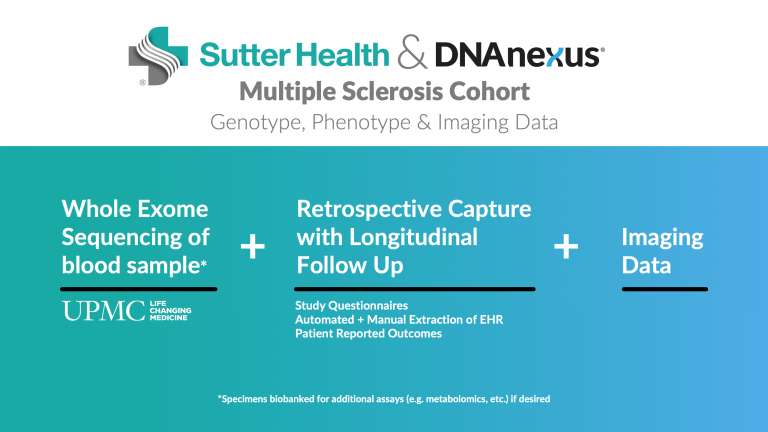Featured Webinar: A Novel Approach to Applying Genomic Patient Data to Improve Multiple Sclerosis Treatments. Watch Today.
It’s World MS Day, a day dedicated to raising awareness of the invisible symptoms of multiple sclerosis and its unseen impact on quality of life for an estimated 2.3 million people across the globe.
Indeed, multiple sclerosis is a complex, lifelong disease whose highly variable course means that MS patients face each day not knowing which potentially disabling symptoms might strike. Some may experience vision challenges or cognitive impairment. Others may lose the ability to walk. Still others may enjoy long periods of remission.
Despite the prevalence of this immune-mediated disease of the central nervous system, its specific phenotypic and genetic drivers remain unknown and the disease has no cure. And since MS varies so dramatically from person to person, from day to day, with multiple disease progression subtypes, it is extremely complex to study.
While a number of genetic studies have contributed to our understanding of genetic predisposition to MS, most clinicians lack the resources to perform more extensive sequencing of their patients’ DNA to identify potential genetic contributions to disease onset, progression, and therapeutic response. MS researchers also believe the disease is probably underdiagnosed, but there is a lack of biomarkers or blood tests to help them make a more precise diagnosis or understand their individual patients’ prognosis and likely response to medications.
“We know that disease course and presentation of symptoms vary by gender, age, socioeconomic status, and ethnicity. But we don’t know which treatment would be optimal for which patients, and why,” says neurologist Joanna Cooper, MD, an MS expert at Sutter Health, whose physicians care for approximately 3,000 MS patients with all forms of the illness who come from diverse communities in 26 hospitals and 28 ambulatory surgery centers across Northern California.
Adding to the difficulties in tackling the complexities of MS is the fact that the disease-specific datasets needed to fuel a precision medicine approach to MS research either don’t exist, fall short in clinical or genomic data, or aren’t accessible to the drug companies trying to develop diagnostic and therapeutic tools.
Addressing our gaps in understanding this complex disease will require a different approach to collecting data on MS patients, and a technology platform that enables clinician researchers to interrogate that data to identify better biomarkers of diagnosis, prognosis, and treatment response.
Luckily, complexity is where DNAnexus excels. Our DNAnexus Apollo™ Platform melds enormous amounts of clinical and genetic data in an easily explorable database that enables seamless, secure collaboration among medical, academic, and pharmaceutical teams who are all devoted to improving health outcomes for patients with diseases like MS.
If Ever The Twain Shall Meet
Recognizing the common goals of MS researchers in healthcare systems and pharmaceutical R&D teams presented an opportunity for DNAnexus to bridge the discovery gap with a unique data solution. By partnering with healthcare systems to run observational studies collecting extensive clinical and genomic data on their MS populations, DNAnexus could enable healthcare providers to gain access to genomic data generated with the latest sequencing technology. Pharmaceutical companies would gain access to de-identified real-world clinico-genomic data from diverse patient populations. And patients would ultimately benefit from accelerated discoveries, and improved treatment pathways and outcomes, while feeling secure that their data and privacy are being protected. Everybody wins.
This is the motivation behind our new Clinico-Genomic Data Solution, which will leverage its network of healthcare partners to create high-quality, longitudinal, deeply curated disease-specific datasets.
The first partners in the project will be Sutter Health and the University of Pittsburgh Medical Center.
A multi-disciplinary team of clinical researchers, data analysts, and neurologists at the Sutter Health Center for Precision Medicine will collect extensive clinical and imaging data from MS patients. The Genome Center at the University of Pittsburgh Medical Center (UPMC) will generate clinical-grade genomic data from blood samples contributed by the program’s participants. These linked clinico-genomic datasets will then be uploaded to the DNAnexus Apollo Platform, where Sutter researchers and approved collaborators can access the data for translational research.
Beginning in June 2019, the Sutter team will collect electronic health record (EHR) data, patient-reported outcomes, imaging data, and blood samples from more than 500 MS patients. UPMC will perform whole exome sequencing (WES) of the samples, which will also be kept in a biobank for future analysis, if needed. Patients will be followed for five years.
Sutter scientists will be able to use the data to conduct their own precision medicine research to inform therapeutic decisions for their patients. De-identified data will also be shared with approved collaborators (e.g. pharmaceutical R&D teams ), who are eager for longitudinal, diverse, real-world data that could shed insight into the natural history of the disease, the heterogeneity in disease progression and response to disease modifying therapies, as well as the genetic underpinnings of disease subtypes, progression, and patient response to disease-modifying therapies.
At the Nexus of it all is DNAnexus.
With our powerful computational platforms, our expertise curating both clinical and genomic data, and our user-friendly research interfaces, DNAnexus provides the infrastructure that will make such complex precision medicine initiatives possible.
Join us, in collaboration with our partner Sutter Health, for a webinar—A Novel Approach to Applying Genomic Patient Data to Improve Multiple Sclerosis Treatments— which is on demand now. Watch today.
DNAnexus will help our partners overcome some of the challenges involved in large-scale data collection, storage, and analysis. One of the most difficult parts of the project, for instance, is clinical data extraction. From demographic details to symptom descriptions and prescription history, there are more than 300 clinical data elements that Sutter will be extracting from its electronic health records.
“It’s not just input of data, but also the export of DNAnexus expertise that will help us do a better job collecting and curating data,” says Gregory Tranah, Ph.D., director of the Center for Precision Medicine at Sutter Health.
“At the end of the day, my job is to bring solutions to our patients, and partnership is the best way to make this happen,” he added. “We’re hoping that DNAnexus can continue to be a matchmaker for us into this larger world of academia, industry, and governmental organizations who want to do large sequencing studies.”



.png)
.png)
.png)